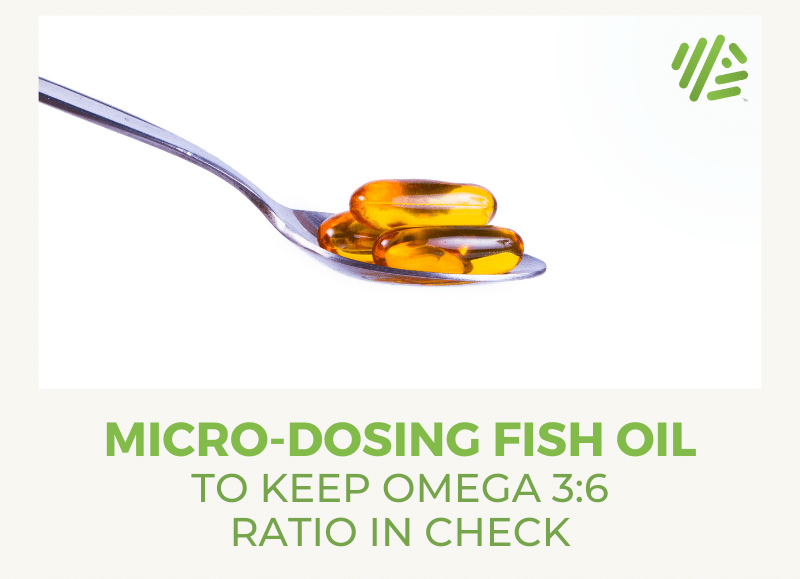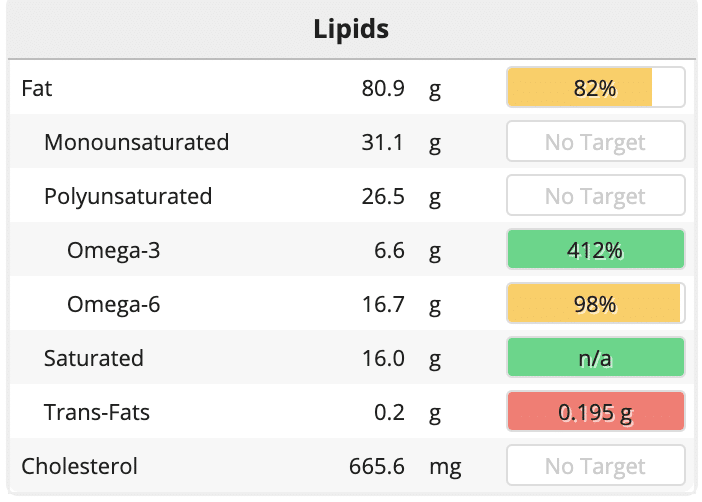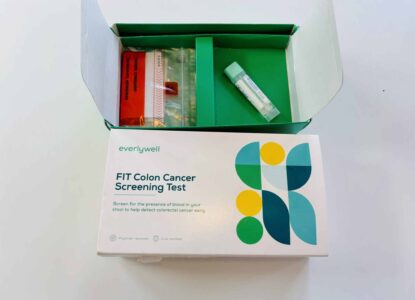Micro-Dosing Fish Oil to Keep Omega 3:6 Ratio in Check

Contents
Fish oil supplements are a controversial topic.
As we touch on in our fish oil buying guide, many fish oil supplements contain rancid and damaged fats and the content of EPA and DHA (the two most important types of omega-3 fatty acids) is often overstated.
In some cases, low quality fish oil supplements contain more saturated fat than they do omega-3 fats.
For this reason, the first step before deciding on a fish oil dose is to identify a good brand. However, once you’ve done that, the next decision is how much fish oil to take, if you decide to take any fish oil at all.
Does fish oil have proven benefits?
In the scientific literature, the long term benefits of fish oil supplements are contradictory.
For example, multiple meta-analyses, which are summaries of many different studies, have found that taking fish oil does not prevent heart disease. 1 2
But then you have the recent Vascepa trial, which looked at the impact of taking 2 grams of medical grade EPA twice a day on the incidence of stroke and death from heart disease. The death rate and heart attack rate was lower in the group taking the EPA medication.
The Vascepa trial was published in the New England Journal of Medicine, however, despite the promise of this one study, fish oil supplements have been associated with bad outcomes in other studies. 3 4
A recent study that appeared in JAMA found no benefit from giving fish oil to high risk cardiovascular patients.
Fish oil is an important source of omega-3 fatty acids
The dilemma for those looking to eat well is how do you get adequate amounts of omega-3 fatty acids, especially if you follow a more plant based diet?
Supplementing with fish oil remains controversial, but the benefits of adequate omega-3 fatty acids in the diet are not.
For example, this study, appearing in the Australian and New Zealand Journal of Psychiatry, which found that EPA supplementation was just as effective at treating depressive disorder as was a commonly prescribed prescription drug. Or this study which found that balancing the fatty acid intakes of elderly women (by giving them 2.5 grams a day of EPA) improved symptoms of depression.
My decision to micro dose
So, what I hear you saying at this point is, wait a minute, all the beneficial studies you’re citing administered heavy doses of omega-3, and you’re micro-dosing?
Yes, luckily I am not sick with heart disease and I am not depressed.
At this point, that level of intervention isn’t necessary for me. Instead, I want to be vigilant about keeping my omega-6 to omega-3 intake in balance. Too much omega-6 hinders the ability of the body to get and use EPA, so as my intake of omega-6 relative to omega-3 goes up, my levels of healthy omega 3 overall goes down.
Fish oil is a tool I use to keep things in balance and more aggressively target my omega-6 to omega-3 ratio, not something I choose to mega-dose under the philosophy “more is better.”
For example, even inside of a single day of eating, the benefits of a small dose (around a tsp) of Rosita Cod Liver Oil are obvious when you start to track your macro and micronutrient ratios.
Using an app like Cronometer, you can see the change in omega-3 to omega-6 ratio when direct EPA and DHA is added to the diet. In the visual below, a dose of cod liver oil, as well as some algal oil, bumped my omega-3 intake up to a ratio of about 2.5:1 omega-6 to omega-3.

Side note: Cronometer adds in the trans fat whenever you use oil, and in this case I cooked eggs in a combo of ghee and avocado oil. That gave me the fractional uptick in trans fat.
Why does balancing omega-3 to omega-6 fats matter?
When we eat more omega-6 fatty acids (as we tend to do in the modern day Western diet) than beneficial omega-3 fats, the result is inflammation. 5 6
The meat and eggs many of us eat on a daily basis are already higher in omega-6 fatty acids as a result of the industrial farming system feeding corn, soy and other low quality GMO grain to these animals.
Next, factor in all the vegetable oils found in everything from gluten free bread to your favorite salad dressing, to your morning omelette at the local diner, and you’re in an omega-3 deficit relative to the omega-6 rich diet most consume.
Testing EPA / DHA to determine fish oil dose
Ok, so let’s say you’re a little low on omega-3 and want to shift to a better omega-6 to omega-3 balance.
You can compensate by eating wild salmon and other fatty fish, and probably should, but even the best of these fish carry a toxic burden. It’s likely not wise to eat fish every day of the week, no matter how pristine. And here’s the thing: eating fatty fish is no guarantee that your omega-3 fatty acid levels will be where you want them at your next blood draw.
The fish oil regimen any of us take should be tailored to our lab results.
If we’re low on EPA and DHA, or if we want to better balance the ratio of arachidonic acid to EPA, take the amount of supplemental EPA and DHA you need to get the ratios in check.
Don’t take more.
There is a well documented, proven benefit to balancing omega-3 to omega-6 consumption in favor of omega-3. 7
There is not a proven benefit in taking mega-doses of over the counter fish oil.
Finding the right fish oil dose
If you opt out of the fish oil path and testing confirms you have adequate levels of omega 3, great. According to long time nutrition commentators like Dr. Barry Sears, the ratio of ARA to EPA that is optimal is somewhere between 1.5 – 4.
In these cases, there is no need to go any further, especially if you are feeling sharp and healthy.
However, if you test low, fish oil, as a bioavailable form of EPA and DHA, can start to look like an attractive option, but how much to take?
Many advocate for mega dosing fish oil, and it’s true that of the therapeutic applications for EPA and DHA have been discovered in higher dose pharmaceuticals.
Does it follow that the average Joe should go out and take large doses of fish oil everyday?
As with anything, I’m sure it depends on the individual. Fish oil is a blood thinner and some people develop side effects when taking high doses.
Fish oil side effects
In the Vascepa trial, the group given the EPA drug had higher incidents of “serious bleeding events.” Not everyone will tolerate a lot of fish oil.
I find benefit from taking 2-3 days consecutive of about 600mg and 425mg of DHA:EPA.
I notice a calming effect and increased cognitive function, however, if I up the dose, I develop side effects reliably, the primary one feeling a little light headed. I also find that more than a few days at this dose is sub optimal for me as well. Taking too much fish oil, especially cod liver oil which is rich in Vitamin A, K and D can cause unwanted side effects, dizziness being a common one.
Taking small doses and skipping multiple days a week is the best bet for me.
This is essentially the regimen outlined by longevity researcher Valter Longo in his book The Longevity Diet. Longo recommends a fish oil capsule, but only a couple times a week.
One of the benefits of buying bottled fish oil, as opposed to fish oil capsules, is it’s easier to create a custom dose based on what works best for you.




I have been following this supplement for years and over time, with full skepticism have come to believe it’s one of the most important ones. So, many questions come up with trials that “prove” or “disprove” the Omega 3 benefits.
1) Was the dosage adequate? Initial trials years ago used 3-5 grams of Omega 3. Other trials use as little as <1 gram. Guess which ones don't show results.
2) Is there a measurement of levels achieved in body? There are good tests available and while some subjects may reach desired levels, others may fall way short in the time and dosage studied. The Japanese, who are held as the standard for fish related cardiac health, have 8-12% in blood. Do we know whether we are achieving these levels in participants or is it just "give them some convenient amount and see what happens"?
3) Are the studies confounding effects by combining two key products/variables that might have overlapping effects? Like only testing effects of these oils when used alongside statins? This seems to be an issue. Imagine if you were trying to verify if caffeine had an effect and administered it alongside methampheatime. "Nope, caffeine showed no change on alertness when we gave somebody a cup of coffee. Must not do anything."
4) Who is being studied and what are the endpoints? Is that profile definitive and useful for the rest of us? If 70 year olds on statins had no fewer cardio events when taking x dosage of x oil, does that mean that a 60 year old with marginal triglyceride levels, -not on statins- will see no improvement/benefit?
I think that you might benefit from taking a more serious look beyond the headlines here. Does Dayspring reject these oils as no therapeutic benefit? Have you listened carefully to William Harris? He might be the one who developed and is selling tests, but he's a solid scientist, not just a trend surfer/salesmen.
I know I sound like a "fanboy" but the details still count. And don't forget that we also have signs of other benefits including cerebral health. It's a big one for us APOE4 folks.
I suggest you test your own basic levels and reconsider from there. Just because you are young and not getting heart pains or whatever does not mean that CVD is not already underway in your body. It's a slow process and when it shows itself, it's already late in the game.
Cheers!
Steven, thanks for the comment. The whole point of the post is to test fatty acid levels with a physician and go from there. I have had my levels tested multiple times. Happy Thanksgiving.